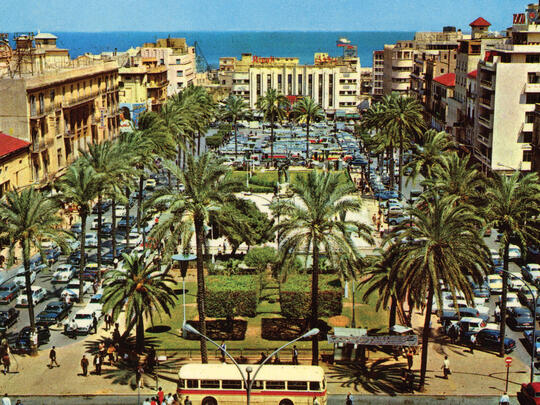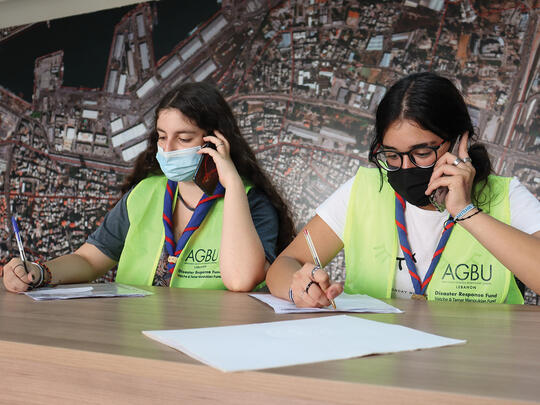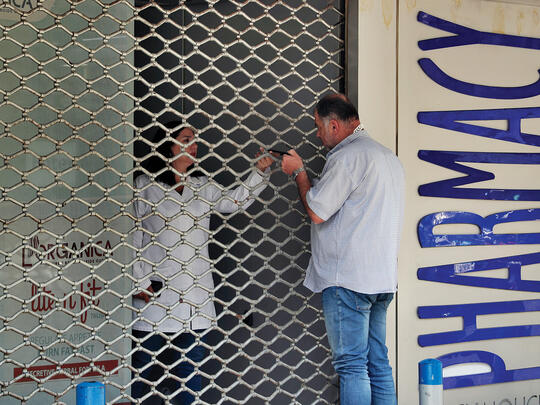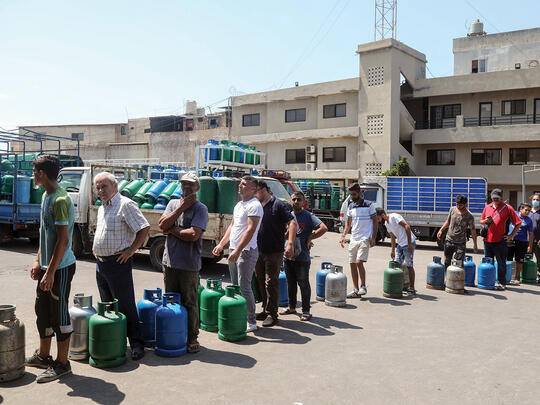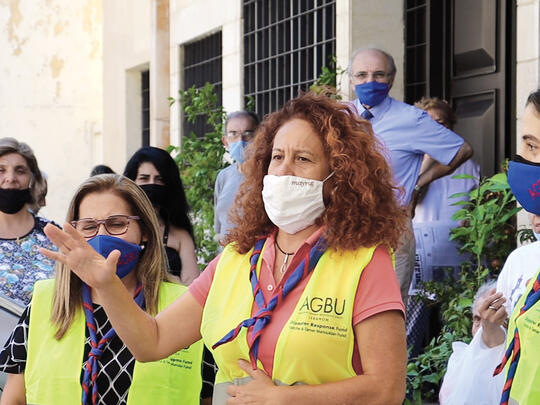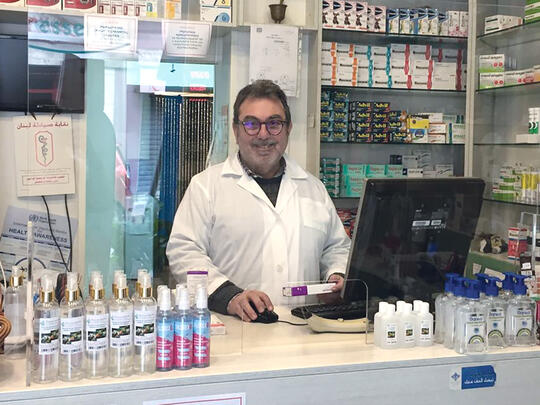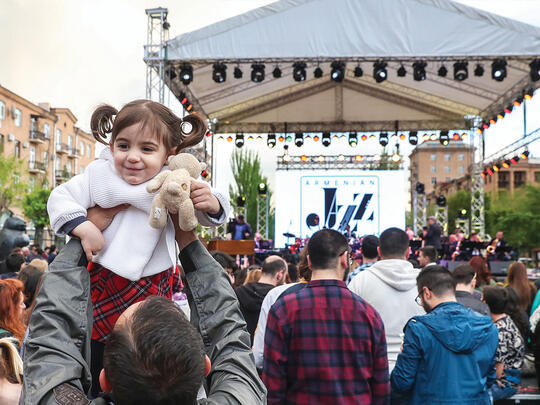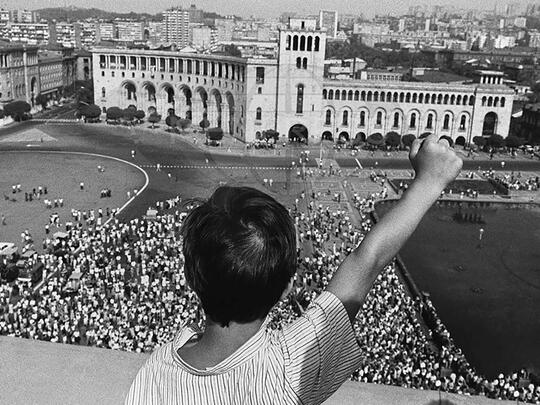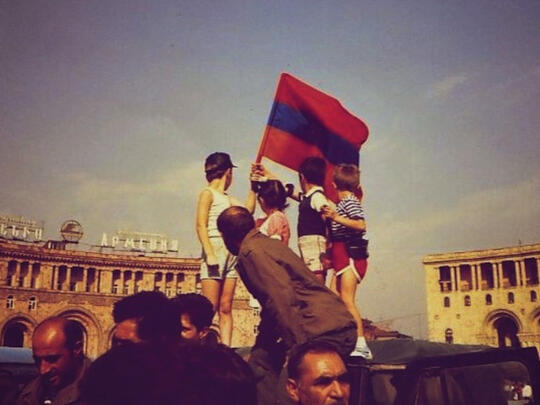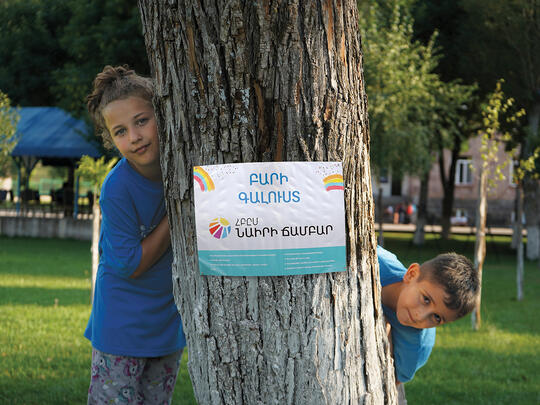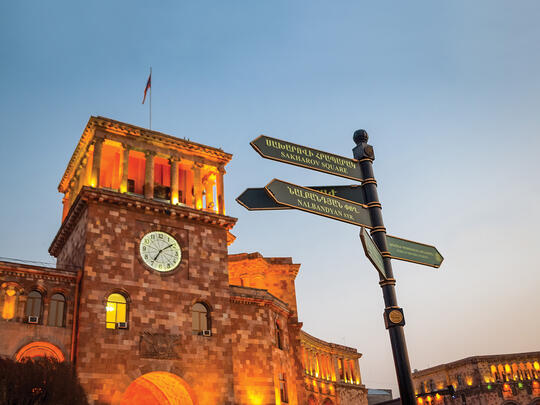By most accounts, in the media and on the street, the reversal of fortunes that has swept all strata of Lebanese society has plunged the country into widespread scarcity and deprivation. While Gary Nazarian, an active member of AGBU Lebanon, has been on the frontlines of the organization’s heroic relief efforts, he takes a cautiously optimistic outlook on Lebanon’s future. He agreed to speak with us and take time out from his weighty responsibilities as an owner of an regional textiles business, a family man with young children, a post-grad looking to complete this Executive MBA from his alma mater, The American University of Beirut, and a humanitarian actively working to help his community and compatriots see their way through the other side of this multi-layered crisis.
You just returned from a business trip. How has the financial crisis impacted your company?
My business has been affected much the same as everybody else’s. Our sales are down, we have a lot of turnover in personnel. Our business and personal bank accounts have been frozen and our currency depreciated, between sevenfold to tenfold. Yet, I consider myself fortunate in that I have businesses outside of Lebanon that are still functioning to capacity and generating income. Those who only do business in Lebanon do not have that advantage and they bear the brunt of it.
How have these successive crises affected your family life?
I have three daughters, the oldest 12, and the youngest three. The pandemic really overwhelmed everyone. We were stuck at home for a year with online schooling and no social interaction.
But it was the August 4th blast in 2020 that really got to all of us. Our house is right on the perimeter of the explosion. I mean, sitting at home, supposedly a safe environment, and suddenly your world is turned upside down. So we had a lot of parenting to do. It took time, but thankfully, through friends, family, the community, the girls have been able to move through it.
As for the financial situation, the older girls are aware of it. They see the long lines at the gas station. They know something is not right. That the electricity comes and goes constantly, like it just went out a couple of minutes ago. The Internet connection, especially during the pandemic and homeschooling, was faulty at best. Now, they are back to the classroom, a great relief to both the parents and the kids.
The prevailing news reports predict that the financial crisis won’t be resolved for years. Do you agree?
Unfortunately this is the case; it’s difficult to feel hopeful. Our politicians and our government seem distant from the actual population and what’s going on. But this being said, Lebanon has always been like this. People always say that the Lebanese people are resilient. And I think this has proven true, especially nowadays when the situation seems so bleak. For one thing, you have institutions like AGBU and individuals that take intiatives to help their family, friends, and community.
What is the “special sauce” in the Lebanese character that keeps them resilient?
As you just mentioned, it’s like a magic sauce. In my view, struggles over the past century—from the French colonization and, before that, the Ottoman Empire—has toughened us. Then there was independence and the civil war, which I lived through in the 80s and early 90s. I think we Lebanese grow up with a thick skin and tend to adapt to any situation we are served. With Lebanese Armenians it is even more so because, in my opinion, we are an integral part of the Lebanese society but our own history speaks to our resilience. We were marched over the desert to Aleppo and then all the way to Lebanon. Despite the suffering of the Genocide survivors, they were able to pull through and even flourish within a few generations. So I think history helps us cope with adverse times like these.
AGBU creates this sense of belonging, in which, throughout its history, when disaster would strike, something inside us would pull us together to serve the greater good.
Some of your contemporaries with young families have decided to emigrate. Why not you?
Any citizen or human being would want to have basic needs taken care of, whether it be in education, healthcare, social, etc. And usually, in more civilized countries and modern societies, these needs are expected as citizen rights. If the people see they are unable to get the necessities out of their government and have a chance to leave, they will. But the key word is chance. If they get the chance to obtain a visa to the U.S. or Canada, Australia or Germany, the popular countries for immigration, then they are more inclined to move, as they have nothing to lose. Many who decide to leave have either lost everything or haven’t much holding them back.
For me, I am invested in this country, both emotionally and financially and maybe in my case more emotionally. After all, my family is here, my wife’s family is here, my kids grew up here and many of their friends remain. Sure, some did leave. But I would like to think they left temporarily and would come back, once the situation settles. And, for me, the pros still outweigh the cons.
After the explosion, you helped form the AGBU Lebanon Disaster Committee. How did it all come together so quickly?
As I was saying, this is all interrelated and what AGBU is doing is at the core of what the Lebanese people or the Lebanese Armenians do. So, the basic necessities, which people would usually rely on government or the social system to give, AGBU has stepped in to supply them. We were first to start distributing food boxes. Our scouts and volunteers distributed 10-20 boxes a month. Then the financial crisis hit and they were distributing 100-200. We reached a point where we were distributing 1200 boxes a month from our center or dispensaries. And yet we’re still not doing enough. There are an additional 500 to 1000 families on our waiting list.
Right now, our main areas of relief are focused on tackling food insecurity, providing healthcare and psycho-social services, and supporting education. So AGBU, being the pioneer, has really helped bring the community back from the brink.
How were you able to enlist so many volunteers to make this relief possible?
After the explosion, our scouts and volunteers, without any mention or coordination from anybody in leadership, were on ground the next day. But we started seeing on their social media how they organized themselves among people they knew, including relatives, friends and family, even random do-gooders. Watching these young people act ahead of us gave us the inspiration to form a special committee under AGBU Lebanon President Gerard Tufenkjian’s leadership to spearhead decisions. It’s composed of just a few people. And there isn’t a chain of command or anything. It was like a beehive of people buzzing in and out of the community center, everyone trying to do their part or share what they knew, so they could be of service. The AGBU administration helped put all the pieces together.
Were AGBU scouts trained in what to do in a disaster or crisis?
It’s more an innate feeling. Whether they are scouts or students at our schools or members of AGBU as a whole in the different committees, whether it is in the dance group, the basketball team and theater group, AGBU creates this sense of belonging, in which, throughout its history, when disaster would strike, something inside us was triggered to pull us together to serve the greater good.
You mentioned psycho-social therapy as a service AGBU provides. How did that happen?
We recruited qualified psychiatrists that tend to these children and it’s mostly talking and sharing and evaluation. We have four therapists; one is full time at the school; and the rest are at our community center. Once they make an evaluation, they can recommend to the parent which direction the child should take. And when the parent or other adults need help, they too are referred to the right resources. Through our school and dispensaries, we had around 100 one-to-one therapy sessions for the students and about 350 students in group sessions.
We try to explain to people that, if you need emotional or mental help, there’s no shame in it, you should come and ask. We’re here to stand by you and help you move on. We’ve had positive feedback on that.
Have your psycho-social services helped shift attitudes toward mental health issues?
Yes, there is a certain taboo on this subject—not just among Armenians, but in the Middle Eastern culture talking to a therapist is not very familiar. But as the pioneers we are, AGBU quickly made it available for people who are understandably traumatized. We try to explain to people that, if you need emotional or mental help, there’s no shame in it, you should come and ask. We’re here to stand by you and help you move on. We’ve had positive feedback on that.
You mentioned education and healthcare. How does AGBU assist?
We were the first in the 2018-19 school year to waive tuition to AGBU schools for those who lost their livelihoods because of the pandemic or financial collapse. Our AGBU school benefactor and our AGBU Lebanon president decided it was the right thing to do, because education is considered an essential need in society. As for healthcare, our dispensaries are open to all Lebanese people. We have locations in certain areas that are predominantly Armenian, but we accept all. We reached between 60 to 70 patients a day.
How does the Church help ease the suffering from trauma and loss?
Of course, the Armenian Church remains the backbone of the Armenian culture, Armenian faith. The Catholicos has always been on the side of the Armenian community. Through the Antelias Catholicosate, its various churches and youth committees are helping with healthcare, medicines, and surgeries—free of charge. For its schools, they have also waived tuition. The Catholicosate is supporting Lebanese Armenians’ with severe health conditions by covering medical expenses or hospitalizations.
Is AGBU still offering sports and arts activities during this ordeal?
Yes, we are still active in the arts, the sports and the cultural, now more than ever I think. Our Armenian language, basketball, stretching, taekwondo, football, table tennis, and chess activities have already started. We’re relaunching Zumba classes. But we’re proud that even during these circumstances we’ve been participating in national championships and are exceling. We are restricted to abide by the 60% capacity for indoor activities, so you can imagine how many more people are interested.
People in the community need AGBU in order to express themselves, to talk to each other or just to play some sports and exercise. It means that there is life in Lebanon beyond the challenges of daily life. We have each other.
We want to keep the lights on, so people can gather as they did before. It means that there is life in Lebanon beyond the challenges of daily life. We have each other.
What are some signs that community members are here to stay?
After two years of online or no gatherings, our scouts are back with their opening ceremonies. Nearly 500 scouts are back to their weekly gatherings, camps and community service. We are moving forward. And I just want to remind our alumni and our veterans, that if they can stand with us and help support their old scout groups, their school, or whichever group, any small contribution will make a valuable difference.
Another indication of an inclination to stay in the country came when in September 2021, AGBU launched its “Employment Hub” for the Lebanese Armenian community, in particular women and youth. This platform will help talented workers find decent-paying remote or in-person work. It also connects prospective employers to the best talents. In one month, we were able to match 10 applicants with employers and had nearly 112 applicants. This is one indication that people are first looking to find work in the country, not venure abroad. That’s a good sign.
To what extent does AGBU reach the wider community and public?
It depends on the program. For example, with food boxes we help all Armenians, and do not discriminate based on affiliation. There are many other NGOs and social programs that help Lebanese, whether through a Maronite Church or the Catholic Church or the Muslim faith. Each tends to cater to their own constituencies. We try to help everyone. After the explosion, we had hot meal distribution, which was open for any passerby. We set up a stand right next to where the explosion happened. Anyone could pick up a hot meal and even take it home. We distributed many meals that way.
Are you also working with non-Armenian relief organizations?
Yes, we are proud that we had the chance to cooperate with the World Central Kitchen and our own AGBU scout and basketball team alumna turned restauranteur Aline Kamakian to distribute hot meals. We had a visit from Fondation de France and they helped us renovate one of our cafeterias at the center and gave us a grant. We have alot of cooperation with important local NGOs. One of them even has a warehouse in one of our centers to store and distribute their products.
Any other thoughts you wish to share?
Simply, that we are living in the moment and taking each day as it comes. We overcome obstacles large and small by problem solving, applying our skill sets and ingenuity to the task and working together toward a higher purpose. We at AGBU Lebanon take pride in what we have achieved so far and that gives us the confidence to persevere.
Banner photo by George Hanna and Patrick Elias



